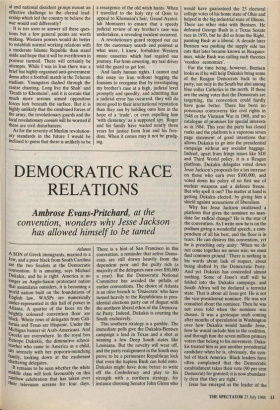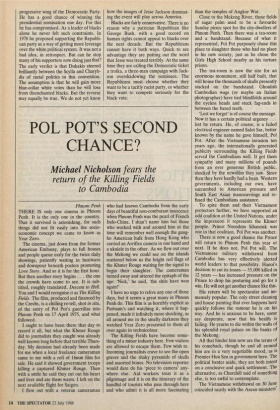DEMOCRATIC RACE RELATIONS
Ambrose Evans-Pritchard, at the
convention, wonders why Jesse Jackson has allowed himself to be tamed
Atlanta A SON of Greek immigrants, married to a Jew, and a poor black from South Carolina are the two finalists at the Democratic convention. It is amazing, says Michael Dukakis, and he is right. America is no longer an Anglo-Saxon protestant nation that assimilates outsiders, it is becoming a World nation built on the foundations of English law, WASPs are numerically under-represented in this hall of power in Atlanta. A quarter of the faces on the brightly coloured convention floor are black. Whole rows of delegates from Cali- fornia and Texas are Hispanic. Under the Michigan banner sit Arab-Americans. And Greeks are everywhere. In the royal box Euterpe Dukakis, the diminutive school- teacher who came to America as a child, sits serenely with her popcorn-munching family, looking down at the exuberant Chattering delegates. It remains to be seen whether the white Huddle class will look favourably on this rainbow celebration that has taken over their television screens for four days. There is a hint of San Francisco in this convention, a reminder that active Demo- crats are still drawn heavily from the dependent poor and the guilty rich (a majority of the delegates earn over $50,000 a year). But the Democratic National Committee has avoided the pitfalls of earlier conventions. The choice of Atlanta is an olive branch to Dixiecrats' who have turned heavily to the Republicans in pres- idential elections party out of disgust with the northern liberal ethos of the Democra- tic Party. Indeed, Dukakis is courting the South exclusively.
This southern strategy is a gamble. The immediate polls give the Dukakis-Bentsen campaign a lead in Texas and a shot at winning a few Deep South states like Louisiana. But the novelty will wear off, and the party realignment in the South may prove to be a permanent Republican lock that even the hapless Bush can hold onto. Dukakis might have done better to write off the Confederacy and play to his strength with a northern strategy, for instance choosing Senator John Glenn who would have guaranteed the 23 electoral college votes of his home state of Ohio and helped in the big industrial state of Illinois. There are other risks with Bentsen. He defeated George Bush in a Texas Senate race in 1970, but he did so from the Right, painting Bush as a liberal. A decade later Bentsen was pushing the supply side tax cuts that later became known as Reagano- mics, while Bush was calling such theories `voodoo economics'.
For the time being, however, Bentsen looks as if he will help Dukakis bring some of the Reagan Democrats back to the party, not only in the South but also among blue collar Catholics in the north. If these are the swing votes that the Democrats are targetting, the convention could hardly have gone better. There has been no poisonous controversy like civil rights in 1948 or the Vietnam War in 1968, and no catalogue of promises for special interests as in 1984. This year the party has closed ranks and the platform is a vaporous seven page statement of good intentions that allows Dukakis to go into the presidential campaign without any socialist baggage. Indeed, apart from fringe issues like SDI and Third World policy, it is a Reagan platform. Dukakis delegates voted down Jesse Jackson's proposals for a tax increase on those who earn over $100,000, and voted down his policy of no first use of nuclear weapons and a defence freeze. But why spell it out? The matter at hand is getting Dukakis elected, by giving him a shield against accusations of liberalism.
Why has Jesse Jackson swallowed a platform that gives the nominee no man- date for radical change? He is the star of the convention. As I write now he is on the podium giving a wonderful speech, a com- pendium of all his best, and the floor is in tears. He can destroy this convention, yet he is preaching only unity: 'When we do not come together we never win; we must find common ground.' There is nothing in his words about lack of respect, about being shafted by the Democratic Party. And yet Dukakis has conceeded almost nothing. Some of Jesse's staff will be folded into the Dukakis campaign, and South Africa will be declared a terrorist state. That is about all Jesse got. He is not the vice-presidential nominee. He was not consulted about the nominee. Then he was not even told when the nominee was chosen. It was a grotesque snub coming after months of speculation in Washington over how Dukakis would handle Jesse, how he would include him in the coalition, and through him the seven million primary voters that belong to his movement. Duka- kis treated him, as just another presidential candidate when he is, obviously, the sym- bol of black America. Black leaders have often complained that the Democratic establishment takes their vote (90 per cent Democrat) for granted; it is now abundant- ly clear that they are right.
Jesse has emerged as the leader of the progressive wing of the Democratic Party. He has a good chance of winning the presidential nomination one day. For this he has compromised. As a leader of blacks alone he never felt such constraints. In 1978 he proposed supporting the Republi- can party as a way of getting more leverage over the white political system. It was not a bad idea, in retrospect. But can he stop many of his supporters now doing just that? The early verdict is that Dukakis steered brilliantly between the Scylla and Charyb- dis of racial politics in this convention. The assumption is that he will gain more blue-collar white votes than he will lose from disenchanted blacks. But the reverse may equally be true. We do not yet know how the images of Jesse Jackson dominat- ing the event will play across America.
Blacks are fairly conservative. There is no reason why a patrician Republican like George Bush, with a good record on human rights cannot appeal to blacks over the next decade. But the Republicans cannot have it both ways. Quick to see advantage they are putting out the word that Jesse was treated terribly. At the same time they are calling the Democratic ticket a troika, a three-man campaign with Jack- son overshadowing the nominees. The Republicans must choose whether they want to be a tacitly racist party, or whether they want to compete seriously for the black vote.















































 Previous page
Previous page